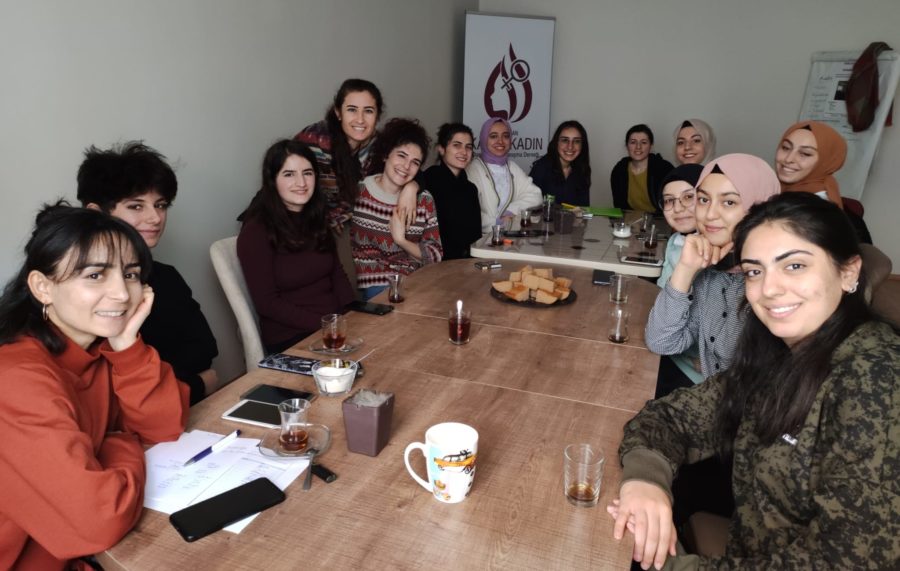
Katre Women’s Counselling and Solidarity Association (Katre Kadın Danışma ve Dayanışma Derneği) received a grant from our Gender Equality Fund in 2021, to implement the Women and the Right to Health project, aiming to increase women’s awareness of sexual and reproductive health issues and rights in Erzincan.
Read below our interview:
You recently completed the Women and the Right to Health project in Erzincan, which you realised with our grant support. Can you tell us about the work you carried out with this project?
We conducted six online trainer trainings with eight of our association’s members and volunteers on the topics of sexuality and body, consent, prevention of unwanted and/or risky pregnancies, sexually transmitted diseases, condoms, rights, and advocacy. By making household visits and placing advertisements on social media, we announced and promoted the project.
We conveyed what we learned about these topics to 40 women through meetings in the two neighbourhoods we identified. We held these meetings in the homes of our volunteers and our association’s office. Some women saw our advertisements on social media and contacted us. Some women wanted to become volunteers in our association at the end of the project. During the meetings, we received applications from women who had been subjected to violence, and we provided the support they requested from us.
Today, as in the past, women are seen as subordinate and exposed to inequalities due to existing gender roles.
We live in a society where talking about sexuality is considered taboo. Can you tell us about the difficulties of working in the field of sexual and reproductive health in your region? What kind of strategies have you developed to combat these difficulties?
One of the main difficulties of working in this field and overcoming the roles imposed on women was the difficulty of breaking the belief in applying traditional methods. We announced the meetings to women, stating that we would discuss reproductive health, contraceptive methods, and women’s health. We were careful not to use the words sexual health and sexuality while promoting the meetings, against the possibility of men preventing women from attending.
At the beginning of each meeting, we determined our rules and we attached great importance to confidentiality. While discussing sexuality and sexual health, the participants asked the facilitators whether they were married or not. This showed us once again the prevalence of the idea that only married women can talk about sexuality. We also addressed this issue in the meetings and talked about it with the participants.
Why is it important for women to be aware of their rights and set personal boundaries? What should be taken into consideration in activities to empower women in these areas?
Today, as in the past, women are seen as subordinate and exposed to inequalities due to existing gender roles. To build an equal, free and non-violent world, women need to be aware of their rights and be able to set personal boundaries. Only we as women can decide what to wear, when and where to go, who to meet, whether to work or not, how many children to give birth to, and whether we want to be mothers or not.
In the meetings, we emphasised that women are the subjects of their own lives. We carried out our work without establishing hierarchies among each other, by building an equal relationship with a feminist perspective. We fight together and build solidarity for an equal, free and non-violent world, with the belief that if one woman is empowered, we will all be empowered.
We fight together and build solidarity for an equal, free and non-violent world, with the belief that if one woman is empowered, we will all be empowered.
How has the grant support from our Gender Equality Fund contributed to your association and activities? Why do you think donors should support work on gender equality?
With this grant support, our association’s ability to provide training has increased. The capacity of our members and volunteers to provide sexual and reproductive health training has improved. As an association, we have worked in the field of sexual and reproductive health for the first time. At the end of the project, we received positive feedback from women, and we realised that there is a pressing need to discuss these issues.
It is crucial for the sustainability of the work carried out in the field of gender equality to be supported by different donors. Since, unfortunately, it is not possible to collect donations or generate income from diverse sources while working in this field. We collect a symbolic membership fee of TRY 1 from our members, and you cannot ask for donations while women have difficulty even paying this fee.
Can you tell us about the future activities and priorities of Katre Women’s Counselling and Solidarity Association?
We will continue to carry out projects that will contribute to the empowerment of women against gender inequality. Our priority is to continue to carry out rights-based work, which is the first step in creating an equal society, and to emphasise that women, children and LGBTI+s are equal citizens. We will continue to advocate for women to play an equal role in all political, economic, social and cultural spheres, taking part in the elimination of practices and laws that treat women as subordinate. In the coming period, we plan to organise trainings on sexual and reproductive health and to conduct self-defence workshops with women. We are currently carrying out fieldwork and awareness-raising groups with women.
About Katre Women’s Association
Established in Erzincan, the association works to ensure an equal life and opportunities for women, children and LGBTI+s, especially in terms of housing, health, law, and sexual and social rights.



